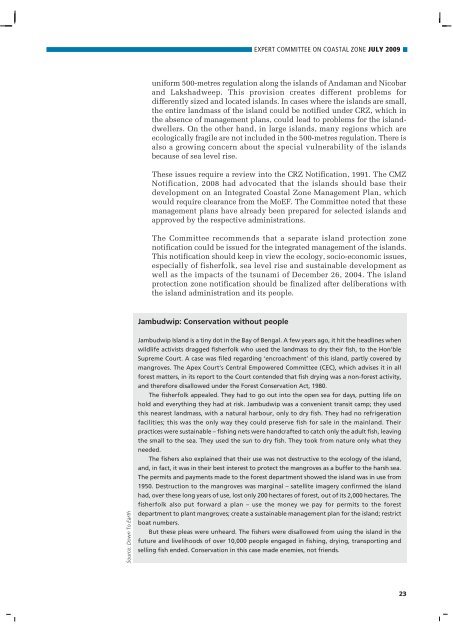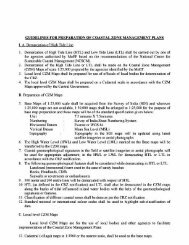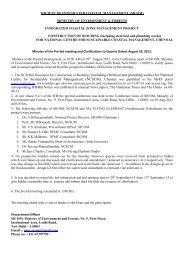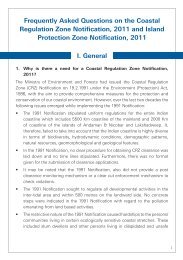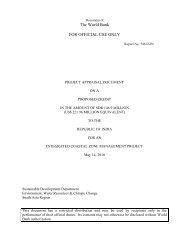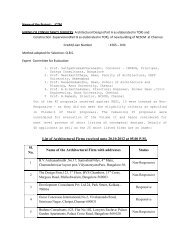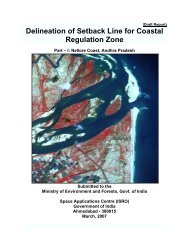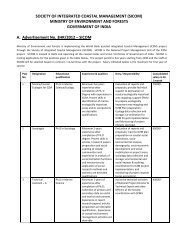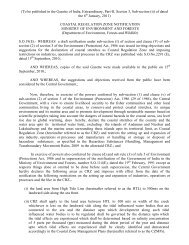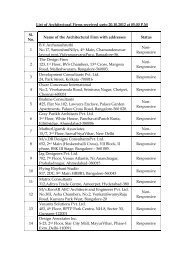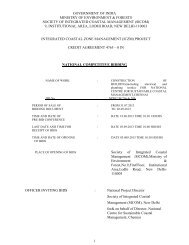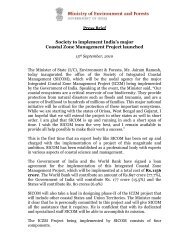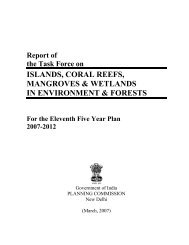FINAL FRONTIER Agenda to protect the ecosystem and ... - Sicom
FINAL FRONTIER Agenda to protect the ecosystem and ... - Sicom
FINAL FRONTIER Agenda to protect the ecosystem and ... - Sicom
You also want an ePaper? Increase the reach of your titles
YUMPU automatically turns print PDFs into web optimized ePapers that Google loves.
EXPERT COMMITTEE ON COASTAL ZONE JULY 2009<br />
uniform 500-metres regulation along <strong>the</strong> isl<strong>and</strong>s of Andaman <strong>and</strong> Nicobar<br />
<strong>and</strong> Lakshadweep. This provision creates different problems for<br />
differently sized <strong>and</strong> located isl<strong>and</strong>s. In cases where <strong>the</strong> isl<strong>and</strong>s are small,<br />
<strong>the</strong> entire l<strong>and</strong>mass of <strong>the</strong> isl<strong>and</strong> could be notified under CRZ, which in<br />
<strong>the</strong> absence of management plans, could lead <strong>to</strong> problems for <strong>the</strong> isl<strong>and</strong>dwellers.<br />
On <strong>the</strong> o<strong>the</strong>r h<strong>and</strong>, in large isl<strong>and</strong>s, many regions which are<br />
ecologically fragile are not included in <strong>the</strong> 500-metres regulation. There is<br />
also a growing concern about <strong>the</strong> special vulnerability of <strong>the</strong> isl<strong>and</strong>s<br />
because of sea level rise.<br />
These issues require a review in<strong>to</strong> <strong>the</strong> CRZ Notification, 1991. The CMZ<br />
Notification, 2008 had advocated that <strong>the</strong> isl<strong>and</strong>s should base <strong>the</strong>ir<br />
development on an Integrated Coastal Zone Management Plan, which<br />
would require clearance from <strong>the</strong> MoEF. The Committee noted that <strong>the</strong>se<br />
management plans have already been prepared for selected isl<strong>and</strong>s <strong>and</strong><br />
approved by <strong>the</strong> respective administrations.<br />
The Committee recommends that a separate isl<strong>and</strong> <strong>protect</strong>ion zone<br />
notification could be issued for <strong>the</strong> integrated management of <strong>the</strong> isl<strong>and</strong>s.<br />
This notification should keep in view <strong>the</strong> ecology, socio-economic issues,<br />
especially of fisherfolk, sea level rise <strong>and</strong> sustainable development as<br />
well as <strong>the</strong> impacts of <strong>the</strong> tsunami of December 26, 2004. The isl<strong>and</strong><br />
<strong>protect</strong>ion zone notification should be finalized after deliberations with<br />
<strong>the</strong> isl<strong>and</strong> administration <strong>and</strong> its people.<br />
Jambudwip: Conservation without people<br />
Source: Down To Earth<br />
Jambudwip Isl<strong>and</strong> is a tiny dot in <strong>the</strong> Bay of Bengal. A few years ago, it hit <strong>the</strong> headlines when<br />
wildlife activists dragged fisherfolk who used <strong>the</strong> l<strong>and</strong>mass <strong>to</strong> dry <strong>the</strong>ir fish, <strong>to</strong> <strong>the</strong> Hon’ble<br />
Supreme Court. A case was filed regarding ‘encroachment’ of this isl<strong>and</strong>, partly covered by<br />
mangroves. The Apex Court’s Central Empowered Committee (CEC), which advises it in all<br />
forest matters, in its report <strong>to</strong> <strong>the</strong> Court contended that fish drying was a non-forest activity,<br />
<strong>and</strong> <strong>the</strong>refore disallowed under <strong>the</strong> Forest Conservation Act, 1980.<br />
The fisherfolk appealed. They had <strong>to</strong> go out in<strong>to</strong> <strong>the</strong> open sea for days, putting life on<br />
hold <strong>and</strong> everything <strong>the</strong>y had at risk. Jambudwip was a convenient transit camp; <strong>the</strong>y used<br />
this nearest l<strong>and</strong>mass, with a natural harbour, only <strong>to</strong> dry fish. They had no refrigeration<br />
facilities; this was <strong>the</strong> only way <strong>the</strong>y could preserve fish for sale in <strong>the</strong> mainl<strong>and</strong>. Their<br />
practices were sustainable – fishing nets were h<strong>and</strong>crafted <strong>to</strong> catch only <strong>the</strong> adult fish, leaving<br />
<strong>the</strong> small <strong>to</strong> <strong>the</strong> sea. They used <strong>the</strong> sun <strong>to</strong> dry fish. They <strong>to</strong>ok from nature only what <strong>the</strong>y<br />
needed.<br />
The fishers also explained that <strong>the</strong>ir use was not destructive <strong>to</strong> <strong>the</strong> ecology of <strong>the</strong> isl<strong>and</strong>,<br />
<strong>and</strong>, in fact, it was in <strong>the</strong>ir best interest <strong>to</strong> <strong>protect</strong> <strong>the</strong> mangroves as a buffer <strong>to</strong> <strong>the</strong> harsh sea.<br />
The permits <strong>and</strong> payments made <strong>to</strong> <strong>the</strong> forest department showed <strong>the</strong> isl<strong>and</strong> was in use from<br />
1950. Destruction <strong>to</strong> <strong>the</strong> mangroves was marginal – satellite imagery confirmed <strong>the</strong> isl<strong>and</strong><br />
had, over <strong>the</strong>se long years of use, lost only 200 hectares of forest, out of its 2,000 hectares. The<br />
fisherfolk also put forward a plan – use <strong>the</strong> money we pay for permits <strong>to</strong> <strong>the</strong> forest<br />
department <strong>to</strong> plant mangroves; create a sustainable management plan for <strong>the</strong> isl<strong>and</strong>; restrict<br />
boat numbers.<br />
But <strong>the</strong>se pleas were unheard. The fishers were disallowed from using <strong>the</strong> isl<strong>and</strong> in <strong>the</strong><br />
future <strong>and</strong> livelihoods of over 10,000 people engaged in fishing, drying, transporting <strong>and</strong><br />
selling fish ended. Conservation in this case made enemies, not friends.<br />
23


